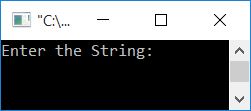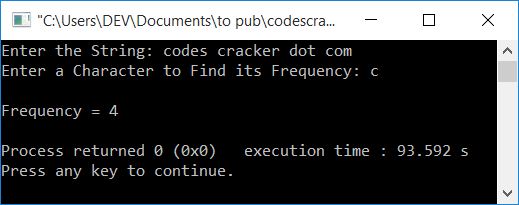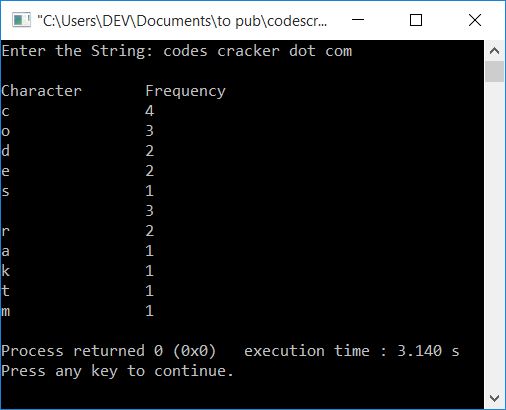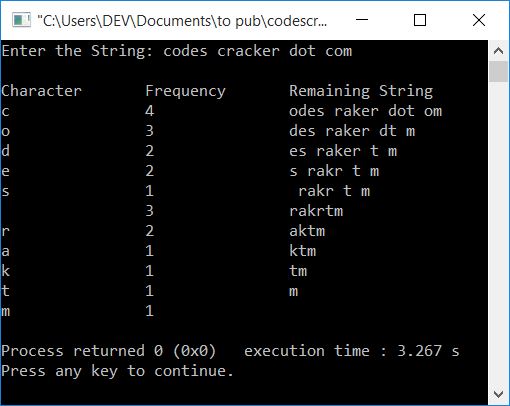- C++ Programming Examples
- C++ Programming Examples
- C++: Hello World
- C++: Get Input
- C++: Print Integer
- C++: Add two numbers
- C++: Add, Sub, Multiply, Div
- C++: Add Digits
- C++: Find Average and Percentage
- C++: Find Arithmetic Mean
- C++: Sum of n Natural Numbers
- C++: Sum of n Numbers
- C++: Square's Area and Perimeter
- C++: Rectangle's Area and Perimeter
- C++: Triangle's Area and Perimeter
- C++: Area and Circumference
- C++: Find Simple Interest
- C++: Fahrenheit to Celsius
- C++: Celsius to Fahrenheit
- C++: Print Prime Numbers
- C++: Reverse a Number
- C++: Swap Two Numbers
- C++: Print Multiplication Table
- C++: Find Factorial of a Number
- C++: Find Factors of a Number
- C++: Find HCF and LCM
- C++: Create a Calculator
- C++: Count Digits in a Number
- C++: First and Last Digit Sum
- C++: Product of Number Digits
- C++: Sum of Squares of Digits
- C++: Interchange Digits of Number
- C++ if-else Programs
- C++: Check Even or Odd
- C++: Check Prime or Not
- C++: Check Alphabet or Not
- C++: Check Vowel or Not
- C++: Check Leap Year or Not
- C++: Check Reverse equals Original
- C++: Check Perfect Number
- C++: Check Palindrome or Not
- C++: Check Armstrong or Not
- C++: Divisibility Test
- C++: Find Labor Wage
- C++: Find Discounted Price
- C++: Find Shipping Charge
- C++: Find Telephone Bills
- C++: Calculate Student Grade
- C++: Largest of Two Numbers
- C++: Largest of Three Numbers
- C++ Number Conversion
- C++: Decimal to Binary
- C++: Decimal to Octal
- C++: Decimal to Hexadecimal
- C++: Binary to Decimal
- C++: Binary to Octal
- C++: Binary to Hexadecimal
- C++: Octal to Decimal
- C++: Octal to Binary
- C++: Octal to Hexadecimal
- C++: Hexadecimal to Decimal
- C++: Hexadecimal to Binary
- C++: Hexadecimal to Octal
- C++ Pattern Programs
- C++: Pattern Programs
- C++: Print Diamond Pattern
- C++: Print Floyd's Triangle
- C++: Print Pascal's Triangle
- C++ Array Programs
- C++: 1D Array Program
- C++: Linear Search
- C++: Binary Search
- C++: Largest Element in an Array
- C++: Smallest Element in an Array
- C++: Find Second Largest Element
- C++: Find Second Smallest Element
- C++: Sum of All Elements
- C++: Multiply All Elements
- C++: Element in Even Position
- C++: Element in Odd Position
- C++: Print Even Numbers in Array
- C++: Print Odd Numbers in Array
- C++: Count Even or Odd Numbers
- C++: Sum of Even or Odd Numbers
- C++: Count Positive, Negative, Zero
- C++: Reverse an Array
- C++: Insert an Element
- C++: Delete an Element
- C++: Merge two Arrays
- C++: Bubble Sort
- C++: Selection Sort
- C++: Insertion Sort
- C++: Common Elements
- C++: 2D Array Programs
- C++: Add Two Matrices
- C++: Subtract Two Matrices
- C++: Transpose Matrix
- C++: Multiply Two Matrices
- C++: 3D Array Programs
- C++ String Programs
- C++: Print String
- C++: Find String Length
- C++: Compare Two Strings
- C++: Copy String
- C++: String Concatenation
- C++: Reverse a String
- C++: Delete Vowels from a String
- C++: Delete a Word from a String
- C++: Count Characters in a String
- C++: Count Words in a String
- C++: Frequency of Words
- C++: Remove Spaces from Strings
- C++: Sort a String
- C++: Uppercase to Lowercase
- C++: Lowercase to Uppercase
- C++: Swap Two Strings
- C++: Check the Anagram or Not
- C++: Capitalize All Words in a String
- C++: Get Numbers from a String
- C++ File Programs
- C++: Read a File
- C++: Write Content to a File
- C++: Append Data to a File
- C++: Read and Display File
- C++: Copy a File
- C++: Merge Two Files
- Count Characters in a File
- C++: Capitalize Every Word
- C++: List Files in Directory
- C++: Delete a File
- C++: Encrypt and Decrypt a File
- C++ Misc Programs
- C++: Print ASCII Value
- C++: Add Binary Numbers
- C++: Generate Random Numbers
- C++: Print a Smiling Face
- C++: Days into Years and Months
- C++: Add Two Numbers using Pointer
- C++: Print Fibonacci Series
- C++: Generate Armstrong Numbers
- C++: Find nCr and nPr
- C++: Get IP Address
- C++: Print Date and Time
- C++: Shutdown and Restart Computer
- C++ Programming Tutorial
- C++ Tutorial
C++ program to find the frequency of characters in a string
In this article, you will learn and get code to find and print the frequency of characters (single and all) in a string using the C++ language. Here is the list of programs available in this article:
- Find the frequency of a character in a string
- Determine the frequency of each character in a string
- Find the frequency of each character and print the remaining string side by side
The user must enter both characters and strings at run-time.
Note: The frequency of a character in a string is the total number of times the character occurs in the given string. or the occurrence of a character in a string.
Find the Frequency of a Character in a String
To find the frequency of a character in a string using C++ programming, you have to ask the user to enter the string first, and then ask them to enter the character to find its frequency, as shown in the program given below:
The question is: write a program in C++ to find the frequency of a character in a string. Here is its answer:
#include<iostream> #include<stdio.h> using namespace std; int main() { char str[100], ch; int i=0, freq=0; cout<<"Enter the String: "; gets(str); cout<<"Enter a Character to Find its Frequency: "; cin>>ch; while(str[i]) { if(ch==str[i]) freq++; i++; } cout<<"\nFrequency = "<<freq; cout<<endl; return 0; }
This program was built and runs under the Code::Blocks IDE. Here is its sample run:

Now supply any string, say codes cracker dot com, and then a character, say c, to find its frequency after pressing the ENTER key. Here is the sample output:

The dry run of the above program with the same user input (as provided in the sample run given above) goes like this:
- Initial values, i=0 and freq=0
- When the user enters the string, then it gets stored in str[] in this way:
- str[0]=c
- str[1]=o
- str[2]=d
- str[3]=e
- str[4]=s
- str[5]=' '
A space - str[6]=c
- str[7]=r
- and so on up until
- str[20]=m
- And when the user enters a character, say c, then it gets stored in ch.
- Now the execution of the while loop gets started. Its execution will continue until its condition (str[i]) is determined to be false. When the value of i becomes 21, then, because at the 21th index, there is no character left, its condition evaluates to be false.
- The condition str[i] or str[0] (on putting the value of i) or c evaluates to true on the first run of the while loop, so program flow goes inside the loop.
- And the condition of if, that is, ch==str[i] or c==str[0] or c==c, evaluates to be true, therefore program flow goes inside the if's body and the value of freq gets incremented. So freq=1
- Now the value of i also gets incremented, and the program flow goes back and evaluates the condition of the while loop again with the new value of i (1).
- That is, the condition str[i] or str[1] or o evaluates to true again, and the program flow returns to the loop.
- But this time, the condition of if, that is, ch==str[i] or c==str[1] or c==o, evaluates to be false, therefore the value of freq does not gets incremented. So only the value of i gets incremented. Now i=2, and the program flow goes back and evaluates the condition of the while loop again.
- This process continues until its condition is evaluated as false.
- Every time we enter its body, we compare the value of ch with each and every character available in the string str. If a character gets matched, then the value of freq gets incremented.
- Therefore, after exiting the loop, we'll have a variable freq that holds the character frequency. So just print its value as output.
Determine the Frequency of All Characters in a String
This program asks the user to enter the string alone. Because this program finds and prints the frequency of all characters in a given string.
#include<iostream> #include<stdio.h> #include<string.h> using namespace std; int main() { char str[100], ch; int i, j, k, len, freq=0; cout<<"Enter the String: "; gets(str); len = strlen(str); cout<<"\nCharacter\tFrequency"; for(i=0; i<len; i++) { ch = str[i]; for(j=0; j<len; j++) { if(ch==str[j]) { freq++; for(k=j; k<(len-1); k++) str[k] = str[k+1]; len--; str[len] = '\0'; j--; } } cout<<endl<<ch<<"\t\t"<<freq; freq=0; i--; } cout<<endl; return 0; }
Here is its sample run with user input, codes cracker dot com:

In the preceding program, whenever a character matches a character at any index, we shift all the characters from that index back to one index.
Note: Don't forgot to initialize a null-terminated character (\0) at the last index of the new string.
Count each character and print the remaining string every time
This program is identical to the previous one. The only difference is that this program also prints the remaining string in the third column:
#include<iostream> #include<stdio.h> #include<string.h> using namespace std; int main() { char str[100], ch; int i, j, k, len, freq=0; cout<<"Enter the String: "; gets(str); len = strlen(str); cout<<"\nCharacter\tFrequency\tRemaining String"; for(i=0; i<len; i++) { ch = str[i]; for(j=0; j<len; j++) { if(ch==str[j]) { freq++; for(k=j; k<(len-1); k++) str[k] = str[k+1]; len--; str[len] = '\0'; j--; } } cout<<endl<<ch<<"\t\t"<<freq<<"\t\t"<<str; freq=0; i--; } cout<<endl; return 0; }
Here is its sample run with the same user input as provided in the previous program:

The same program in different languages
- C Find Frequency of Character in String
- Java Find Frequency of Character in String
- Python Find Frequency of Character in String
« Previous Program Next Program »